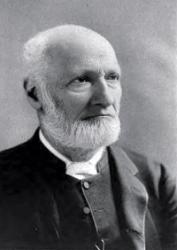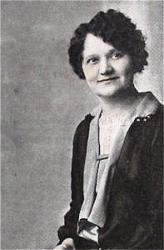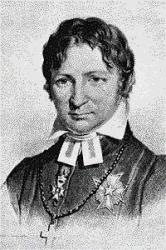Planning worship?
Check out our sister site, ZeteoSearch.org,
for 20+ additional resources related to your search.
- |
User Links
Person Results
Joseph Anstice
1808 - 1836 Person Name: J. Anstice Author of "O Lord, how happy should we be" in The Academic Hymnal Anstice, Joseph , M.A., son of William Anstice of Madeley, Shropshire, born 1808, and educated at Enmore, near Bridgwater, Westminster, and Ch. Church, Oxford, where he gained two English prizes and graduated as a double-first. Subsequently, at the ago of 22, he became Professor of Classical Literature at King's College, London; died at Torquay, Feb. 29, 1836, aged 28. His works include Richard Coeur de Lion, a prize poem, 1828; The Influence of the Roman Conquest upon Literature and the Arts in Rome (Oxford prize Essay); Selections from the Choice Poetry of the Greek Dramatic Writers, translated into English Verse, 1832, &c. His hymns were printed a few months after his death, as:— Hymns by the late Joseph Anstice, M.A., formerly Student of Christ Church, Oxford, and Professor of Classical Literature, King’s College, London, Bridgwater, 1836, and thus introduced:—
"As none of the following Hymns had the advantage of being corrected and prepared for the press by their lamented Author, his family have not considered themselves at liberty to bring them before the public; but, having reason to believe that a large circle of surviving friends will be gratified by possessing a memorial of the manner in which some of his leisure hours were employed, and of the subjects which chiefly occupied his thoughts, during the last few months of his life, they have consented to their being printed for private distribution.—-Bridgwater, June, 1836."
This work contains 52 hymns on various subjects, together with a poem "To my Hymn Book." The circumstances under which they were written are thus detailed by Mrs. Anstice in a communication to the Rev. Josiah Miller, author of Singers and Songs of the Church:—
"The hymns were all dictated to his wife during the last few weeks of his life, and were composed just at the period of the day (the afternoon) when he felt the oppression of his illness—all his brighter morning hours being given to pupils up to the very day of his death."-—S. & S., p. 495.
A few of the hymns are of a joyful character, but the circumstances under which they were written account for the prevailing tone of sadness by which they are chiefly characterized. About one half of these hymns were included by Mrs. Yonge in her Child's Christian Year, 1841. Being thus brought before the public, many soon came into common use. Those in most extensive use are: "Father, by Thy love and power;" "In all things like “Thy brethren, Thou;" "Lord of the harvest, once again;" and, "O Lord, how happy should we be."
-- John Julian, Dictionary of Hymnology (1907)
Joseph Anstice
James Drummond Burns

1823 - 1864 Person Name: James Drummond Burns, 1823-64 Translator of "See, world, your life suspended" in Together in Song Burns, James Drummond, M.A., was born at Edinburgh, February 18, 1823. He studied and graduated M.A. at the University of Edinburgh. In 1845 he became Free Church minister of Dunblane, but resigned through failing health, in 1848, and took charge of the Presbyterian Church at Funchal, Madeira. In 1855 he became minister of Hampstead Presbyterian Church, London. Died at Mentone, Nov. 27, 1864, and was buried in Highgate Cemetery, London.
His hymns appeared in:—
(l) The Vision of Prophecy: and other Poems (Edin., Edmonston and Douglas). This was originally published in 1854, and enlarged in 1858. The Poems are distinguished by vivid colouring and poetic imagination, along with directness, delicacy of execution, pensive sweetness, and tenderness. They have never however become widely popular. Included are 29 "Hymns and Meditations," many of which rank among the very best of our modern hymns for beauty, simplicity of diction, and depth of religious feeling. (2) The Evening Hymn (Lond., T. Nelson & Sons), 1857. This consists of an original hymn and an original prayer for every evening in the month— 31 in all. The Hymns and Prayers alike are characterised by reverence, beauty, simplicity, and pathos. Some of the hymns in this volume are now well known; e.g. "Still with Thee, 0 my God," "Hushed was the evening hymn," "As helpless as a child who clings." (3) Memoir and Remains of the late Rev. James D. Burns, M.A., of Hampstead. By the late Rev. James Hamilton, D.D. (London, J. Nisbet & Co.), 1869. Besides 13 Sermons and the Memoir, this work includes 40 “Hymns and Miscellaneous Pieces." A number of these had appeared in periodicals. Some of them are very good though not equal to those previously published. Also 39 translations of German hymns, which appeared in the Family Treasury, &c., are rendered exactly in the metres of the originals and many had not previously been translated. The translations are generally very good. (4) Burns also wrote the article Hymn in the 8th edition of the Encyclopedia Britannica. [Rev. James Mearns, M.A.]
-- John Julian, Dictionary of Hymnology (1907)
=====================
Burns, James Drummond, p, 197, i. Additional hymns in common use are:—
1. Not, Lord, unto that mount of dread. Safety in Christ. From Vision of Prophecy, 1st ed., 1854, p. 266.
2. O Thou whose tender [sacred] feet have trod. Resignation. From Vision of Prophecy, 1st ed., 1854, p. 227.
3. Thou, Lord, art love, and everywhere. Divine Love. From Vision of Prophecy, 2nd ed., 1858, p. 275.
--John Julian, Dictionary of Hymnology, Appendix, Part II (1907)
See also in:
Hymn Writers of the Church
James Drummond Burns
Philip Schaff

1819 - 1893 Person Name: Philip Schaff, 1819-1893 Translator of "O Bread of Life from Heaven" in Ambassador Hymnal Schaff, Philip, D.D., LL.D., was born at Chur, Switzerland, Jan. 1, 1819. He studied at the Universities of Tübingen, Halle, and Berlin. In 1843 he was appointed a Professor in the German Reformed Theological Seminary at Mercersburg, Pennsylvania, U.S.A., and in 1870 Professor of Sacred Literature in the Union Seminary, New York. As translator, author, and editor, Dr. Schaff holds high rank, both in Great Britain and America. The various Histories and Encyclopedias which he has edited are standard works. His knowledge of hymnology is extensive, and embraces hymns in many languages and of all ages, his speciality being German hymnody. The hymnological works which he has edited alone, or jointly with others, are:—
(1) Deutsches Gesangbuch, 1860; (2) Christ in Song, a most valuable collection of original English and American hymns, and translated hymns, N.Y. 1869, London, 1870; (3) Hymns and Songs of Praise for Public and Social Worship, 1874, in which he was assisted by Boswell D. Hitchcock, and Zachary Eddy; (4) Library of Religious Poetry, 1881, of which A. Gilman was joint editor.
Dr. Schaff has not composed any original hymns. His translations from the Latin are meritorious. He died Oct. 20, 1893.
--John Julian, Dictionary of Hymnology (1907)
Philip Schaff
Herman H. Brueckner
1866 - 1942 Person Name: Herman H. M. Brückner Translator of "Now Rest beneath Night's Shadow" in Praise for the Lord (Expanded Edition) Born: March 11, 1866, Grundy County, Iowa (birth name: Herman Heinrich Moritz Brueckner).
Died: January 25, 1942, Hebron, Nebraska (funeral held in Beatrice, Nebraska).
Buried: St. Paul’s Lutheran Cemetery, Waverly, Iowa.
After ordination in 1888, Brueckner pastored in Illinois, Michigan, Kentucky, and Wisconsin. He later moved to Iowa City, Iowa, and received his Bachelor of Arts degree from Iowa State University in 1917. In 1926, he joined the faculty of Hebron College in Nebraska. In 1938, Wartburg Seminary, Dubuque, Iowa, conferred an honorary Doctor of Divinity degree on him. He retired as professor emeritus from Hebron College in 1941.
Sources:
Erickson, p. 254
Findagrave, accessed 14 Nov 2016
Hustad, p. 213
Stulken, p. 325
© The Cyber Hymnal™. Used by permission. (www.hymntime.com)
Herman H. Brueckner
Anna Hoppe

1889 - 1941 Person Name: Anna Hoppe, 1889-1941 Translator of "O World, See Here Suspended" in Ambassador Hymnal Anna Hoppe was born on May 7, 1889 in Milwaukee, Wisconsin. She left school after the eighth grade and worked as a stenographer. She began writing patriotic verses when she was very young and by the age of 25 she was writing spiritual poetry. After some of her poems appeared in the Northwestern Lutheran, a periodical of the Wisconsin Evangelical Lutheran Synod, they came to the attention of Dr. Adolf Hult of Augustana Seminary, Rock Island, Illinois. He influenced her to write her Songs for the Church Year (1928). Several hymnals include her work, which was usually set to traditional chorale melodies, although she also made a number of translations. She died on August 2, 1941 in Milwaukee, Wisconsin.
NN, from Cyber Hymnal
Anna Hoppe
Georg Joseph Vogler
1749 - 1814 Person Name: G. J. Vogler Composer of "[In allen meinen Thaten]" in Sammlung Kirchlicher Lieder Known also as Abbé Vogler
Georg Joseph Vogler
Stopford A. Brooke

1832 - 1916 Person Name: Stopford A. Brooke, 1832- Author of "Oft as we run the weary way" in Hymns for Schools and Colleges Brooke, Stopford Augustus, M.A., was born at Letterkenny, Donegal, Nov. 14, 1832, and educated at Trinity College, Dublin, graduating B.A. 1856; M.A. 1858. He carried off the Downes prize and the Vice-Chancellor's prize for English verse. On taking Holy Orders he was successively Curate of St. Matthew's, Marylebone, 1857-59; of Kensington, 1860-63; Chaplain to the British Embassy at Berlin, 1863-65; Minister of St. James's Chapel, York Street, London, 1866-75; and of Bedford Chapel, 1876. He was also appointed Chaplain in Ordinary to the Queen, in 1872. In 1865 he published the Life and Letters of the late F. W. Robertson; in 1874, Theology in the English Poets; in 1876, Primer of English Literature, &c. On seceding from the Church of England in 1881, he published for the use of his congregation, Christian Hymns, a collection of 269 pieces. Of these he is the author of:—
1. Immortal Love, within Whose righteous will. Resignation and Prayer for Guidance. No. 183, in 4 stanzas of 6 lines. It has a strong likeness to Card. Newman's "Lead, kindly light," is in the same metre, and might be called a companion hymn thereto. It was repeated in Horder's Congregational Hymns, 1884.
2. It fell upon a summer day. Christ blessing little children. No. 250, in 10 stanzas of 4 lines.
3. It is finished, all the pain. Good Friday. No. 80, in 6 stanzas of 4 lines.
4. Let the whole creation cry. Invitation to Praise God. An imitation of Ps. 148. It is No. 47, in 10 stanzas of 4 lines, and is of special merit. In st. iv., 11. 3, 4 are from another source.
5. Mysterious Spirit, unto Whom. Rest and Joy in God. Based on a translation by J. G. Whittier from Lamartine. It is No. 159, in 3 stanzas of 8 lines. It was repeated in Horder's Congregational Hymns, 1884.
6. Now that day its wings has furled. Evening. No. 13, in 5 stanzas of 4 lines.
7. 0 God, Whose love is near. Divine protection desired. No. 103, in 7 stanzas of 4 lines. This is Toplady's "Your harps, ye trembling Saints" re-written, only st. i. and iv. being absolutely by Mr. Brooke.
8. 0 that Thou would'st the heavens rend And comfort, &c. Peace desired. No. 149, in 4 stanzas of 4 lines. The first line is from C. Wesley; also stanzas ii., 1. 4, but the rest of the hymn is original.
9. 0 Who is this that on a tree. Good Friday. No. 79, in 8 stanzas of 4 lines.
10. Oft as we run the weary way. Heavenly Witnesses of the struggles of Men. No. 188, in 6 stanzas of 6 lines.
11. Still the night, holy the night. Christmas Carol. No. 55, in 3 stanzas of 8 lines. It is a translation from the German, and is noticed under Mohr, Joseph.
12. Through the starry midnight dim. Christmas. No. 53, in 6 stanzas of 3 lines, and the refrain "Hallelujah."
13. When the Lord of Love was here. Life of Christ. No. 66, in 6 stanzas of 4 lines. It has passed into The Norwood Hymnal; and with the omission of st. vi. and the transposition of st. iv. and v. into Horder's Congregational Hymns, 1884. This is his finest hymn.
In addition, Mr. Brooke has made extensive alterations in the text of the hymns which he has adopted from other writers, and has also inserted in many instances additional stanzas into well-known lyrics, and thereby brought them, to some extent, into harmony with his theological views. His own compositions are marked by great freshness of thought and tenderness of expression. [Rev. W. Garrett Horder]
-- John Julian, Dictionary of Hymnology (1907)
Stopford A. Brooke
John Kelly
1833 - 1890 Person Name: John Kelly, 1833-90 Translator of "Upon the Cross Extended" in Lutheran Service Book Kelly, John, was born at Newcastle-on-Tyne, educated at Glasgow University, studied theology at Bonn, New College, Edinburgh, and the Theological College of the English Presbyterian Church (to which body he belongs) in London. He has ministered to congregations at Hebburn-on-Tyne and Streatham, and was Tract Editor of the Religious Tract Society. His translations of Paul Gerhardt's Spiritual Songs were published in 1867. Every piece is given in full, and rendered in the metre of the originals. His Hymns of the Present Century from the German were published in 1886 by the Religious Tract Society. In these translations the metres of the originals have not always been followed, whilst some of the hymns have been abridged and others condensed. His translations lack poetic finish, but are faithful to the originals. [Rev. W. Garrett Horder]
-- John Julian, Dictionary of Hymnology (1907)
==================
Kelly, John, p. 614, i. He died while on a visit to Braemar, July 19, 1890.
--John Julian, Dictionary of Hymnology, Appendix, Part II (1907)
John Kelly
Frans Michael Franzén

1772 - 1847 Person Name: F. M. Franzen, d. 1847 Author of "Når allt omkring mig hvilar" in Svenska Psalm-Boken af År 1819 Franzén, Franz Michael, was born at Uleabôrg, Finland, in 1772, and educated at the University of Abo, where he became Librarian and Professor of Literary History. He was subsequently Minister at Kumla, Orebro, Sweden, and then of Santa Clara, in Stockholm. He was consecrated Bishop of Hernosand, in 1841, and died there in 1847. (See Supplement to Longfellow's Poets and Poetry of Europe.) Of his pieces one is in English common use. It begins "Jesum haf i ständigt minne," translated by Mrs. Charles in her Christian Life in Song, 1858, p. 250, as "Jesus in Thy memory keep" (Looking unto Jesus). Usually it begins with stanza ii., "Look to Jesus, till, reviving."
--John Julian, Dictionary of Hymnology, Appendix, Part II (1907)
Frans Michael Franzén


 My Starred Hymns
My Starred Hymns


